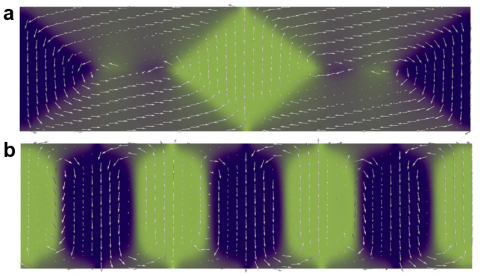Seminar :: February 7 :: Michalis Charilaou
Observation of the effect of mechanical strain on the ferromagnetic state: nanometer-resolution electron holography and simulations
Michalis Charilaou
Department of Physics, University of Louisiana at Lafayette
Abstract
Scientists have long sought to fully understand the intricate mechanisms via which magnetic states change due to mechanical strain. Strain changes the distance between atoms, which in turn changes the electromagnetic forces between them. Even though strains applied in the laboratory impart a miniscule change, on a quantum level, it can have a major effect. In a recent paper [1], we provide new insight into this phenomenon. By combining cutting-edge high-resolution imaging experiments, carried out by the collaborators in Germany, and micromagnetic simulations, which were carried out in Lafayette, we have identified the mechanism via which the magnetic state of the ferromagnet changes upon the application of mechanical strain. We have observed that when a thin film of ferromagnetic nickel is strained, the magnetic domains, i.e., regions of uniform magnetic field, start to change and at a strain of 0.2%, the domain walls form a periodic lattice perpendicular to the strain axis, as seen in the figure below. As a result of this, the response of the ferromagnet is also predicted to change, leading to an effective magnetic hardening. This in turn suggests potential for technological and manufacturing advances related to, for example, the development and construction of advanced magnetized sensors.

[1] D. Kong, A. Kovacs, M. Charilaou, F. Zheng, L. Wang, X. Han, R. E. Dunin-Borkowski: Direct observation of tensile-strain-induced nanoscale magnetic hardening. Nature Communications, 14, 3963 (2023)
Bio
Michalis completed his undergraduate studies in physics in Berlin in 2008 and obtained his PhD at the Swiss Federal Institute of Technology in Zurich in 2012. He spent two years as a postdoctoral fellow at the University of California, Berkeley, and then another 4 years as a senior scientist in Zurich. Since 2018, Michalis has been an assistant professor in the department of physics at UL Lafayette. His research centers on magnetic materials and nanoscopic phenomena. He has published more than 50 peer-reviewed articles, and his work is interdisciplinary, ranging from nanotechnology-related magnetic devices to magnetic bacteria and meteorites.
